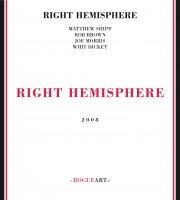Home » Jazz Articles » Album Review » Right Hemisphere: Right Hemisphere
Right Hemisphere: Right Hemisphere
Born in the 1980s, Right Hemisphere is this quartet's self-titled 2008 debut. As is clarified in the liner notes written by three of its members, what is brought to the music is individual growth that applies to the sonic evolution of the whole quartet.
Even though Matthew Shipp engages mid-range evenly planted chords on the piano to initiate the sound, Whit Dickey taps lightly at the snare and cymbal and Joe Morris arranges his climbing mid-range bass pizzicatos according to the piano/drum intro, it is Rob Brown who rallies and cuts through the ambience to sing with his alto saxophone.
Shipp is never far behind on "Right Hemisphere." He throws tonal weight behind Brown's higher pitches and split tones and pushes the envelope on the presence of a string component by going inside the piano ("You Rang"). The piano echoes the alto often, if not specifically, with corresponding tonal gestures, then with supportive chords that emphasize the direction in which the alto is going.
Shipp and Brown split off to fulfill their roles as lead instruments. Shipp takes it on "Dice," which divides the first and latter halves of the recording. His fingers move quickly without fully pressing the keys, the rhythm section behaving in an equally agitated fashion. On a two minute solo spot ("The Sweet Science"), Shipp combines rhythmic melody structuring, its scattering and chordal landings to form the coda.
Brown isolates himself on "Bubbles" singing out un-arpeggiated single notes, reiterated scalar runs and high-pitched clusters in the company of Morris's arco scrubbing and Dickey's delicate cymbalizing. "Falling In" exhibits Brown's strong alto voice—his insistent tempo and persistent tabulation of notes which Morris and Dickey magnify in their responsiveness, either accompanying Brown or on their own.
Morris and Dickey rise to the top on "Lava." About half-way through the nine minute piece, Morris moves the pizzicato with precision and alacrity through the dampened tonality characterizing his bass strings, as Dickey seizes solo moments with his signature restrained drumming configurations.
The apotheosis of the quartet's organic interaction is displayed on "Red In Gray," an aural description of the way sound (or anything, for that matter) can shift. Shifting is about change; and the instrumental give-and-take that happens on this cut is without competition; it happens with a comfortable compliance and significant grace. That is the way good, unforced relationships work, both in the physical universe and on a human scale exemplified by this quartet. This music delivers that poetic, inexorable message.
Visit Matthew Shipp, Rob Brown and Joe Morris on the web.
Track Listing
Right Hemisphere; You Rang; Bubbles; Ice; Hyperspace; Dice; Incremental; Falling In; The Sweet Science; Lava; Red in Gray.
Personnel
Matthew Shipp
pianoMatthew Shipp: piano; Rob Brown: alto saxophone; Joe Morris: double-bass; Whit Dickey: drums.
Album information
Title: Right Hemisphere | Year Released: 2008 | Record Label: Rogue Art
< Previous
Dune
Next >
Panopticon
Comments
Tags
Concerts
For the Love of Jazz
 All About Jazz has been a pillar of jazz since 1995, championing it as an art form and, more importantly, supporting the musicians who create it. Our enduring commitment has made "AAJ" one of the most culturally important websites of its kind, read by hundreds of thousands of fans, musicians and industry figures every month.
All About Jazz has been a pillar of jazz since 1995, championing it as an art form and, more importantly, supporting the musicians who create it. Our enduring commitment has made "AAJ" one of the most culturally important websites of its kind, read by hundreds of thousands of fans, musicians and industry figures every month.




















